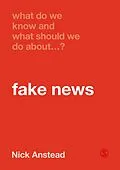Voters need to be informed to make political decisions, but what if their media diet not only prevents them from getting the information they need, but actively shapes inaccurate perceptions of the world?
Drawing on examples and evidence from around the world, this book aims to make a timely intervention to the debate about the concept of fake news. Its underlying argument will have three objectives. First, to offer more precise definitions for a term that is often loosely used. Second, to offer a less technologically determinist view of fake news. New social media platforms, such as Facebook and WhatsApp, are clearly an important part of the story, but they exist in wider social, political and institutional settings. Third, to situate the idea of fake news (and our concern about it) in broader arguments about an ongoing crisis and loss of confidence in liberal democratic institutions. Only with this perspective, it will be argued, can we possibly address the question of what we should do about fake news.
Autorentext
Dr Nick Anstead is Associate Professor in the Department of Media and Communications at LSE. His research focuses on political communication practices and their relationship with political institutions. Additionally, he has researched the ways in which political ideas develop, circulate and are used in debate.
Dr Anstead's work has contributed to public debate on a number of topical issues. He was the co-editor of a Fabian pamphlet The Change We Need (2009, with Will Straw) on what British progressives could learn from the organization and communication of Barack Obama's presidential election victory. This volume had a Foreword by then Prime Minister Gordon Brown. Dr Anstead's Media Policy Project working paper Televised Debates in Parliamentary Democracies (2015, available here) was widely covered by the UK media in the run up to that year's election, and was circulated to senior media figures in the pre-debate negotiation period. The only debate of the election campaign, broadcast on ITV, employed a format similar to that recommended in the report.
Dr Anstead has acted as a consultant for the think tank Unions 21 undertaking research on how trade unions employ the internet in their campaigns. He has spoken at events organized by a number of organizations, including the Fabian Society, Progress, the Institute for Government and the Rand Institute (California and Brussels). He is on the board of 38 Degrees and a Fellow of the Royal Society of the Arts.
Dr Anstead has regularly appeared on national and international media, including BBC Newsnight, BBC One Show, BBC News Channel, More4 News, BBC Radio 4, BBC Radio 5 Live, BBC Radio Scotland, the BBC World Service, AP, AFP, CNN and Reuters. Media enquiries can be made to the LSE Press Office or directly.
Klappentext
The concept of Fake News has become widespread in recent years, particularly since the EU Referendum in the UK and Presidential Elections in the US, both in 2016. Voters need to be informed to make political decisions, but what if their media diet not only prevents them from getting the information they need, but actively shapes inaccurate perceptions of the world?
Drawing on examples and evidence from around the world, this book aims to make a timely intervention to the debate about the concept of fake news. Its underlying argument will have three objectives. First, to offer more precise definitions for a term that is often loosely used. Second, to offer a less technologically determinist view of fake news than much existing literature on the topic. New social media platforms, such as Facebook and WhatsApp, are clearly an important part of the story, but they exist in wider social, political and institutional settings. Third, to situate the idea of fake news (and our concern about it) in broader arguments about an ongoing crisis and loss of confidence in liberal democratic institutions. Only with this perspective, it will be argued, can we possibly address the question of what we should do about fake news.
ABOUT THE SERIES: The 'What Do We Know and What Should We Do About...?' series offers readers short, up-to-date overviews of key issues often misrepresented, simplified or misunderstood in modern society and the media. Each book is written by a leading social scientist with an established reputation in the relevant subject area. The Series Editor is Professor Chris Grey, Royal Holloway, University of London
Inhalt
1. Introduction
2. Background
3. What Do We Know?
4. What Should We Do?
5. Conclusion
